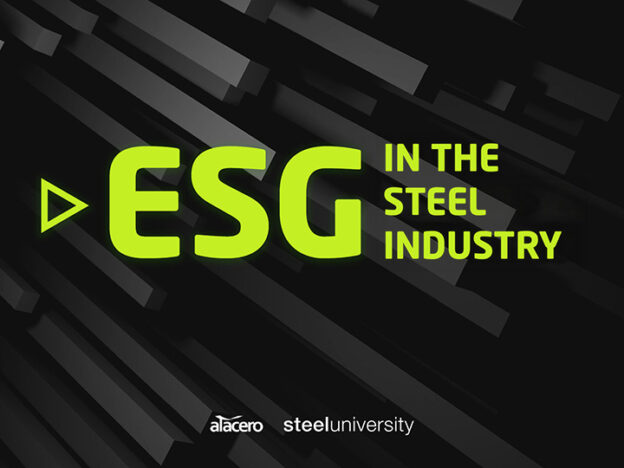Estimated time: 20 hours
Language: Spanish
Modality: Virtual
Description
ESG, an acronym based on the terms Environmental, Social, and Governance, was coined in 2004 in a publication by the UN Global Compact in partnership with the World Bank titled Who Cares Wins. This report introduced the pillars of corporate structure that, according to the study, are most likely to succeed when ESG practices are implemented. Today, ESG is regarded as a new form of corporate sustainability, addressing issues that are fundamental to sustainable development.
The steel industry—present in the value chain of virtually every business and sector—has remained attentive to global trends and has sought to take a leading role in managing these topics. The effort to align purpose with value creation for all stakeholders has brought clear benefits to the sector. Companies aligned with the ESG agenda have improved their management of environmental impacts, implemented transparent actions and policies, and, in collaboration with their employees and other stakeholders, built a culture of trust that leads to better results, both tangible and intangible.
For this reason, Alacero, as the representative of the steel sector in Latin America, recognizing the relevance of this approach to industry management and operations, developed a course specifically for the sector to disseminate and standardize understanding of ESG concepts.
In this course, participants will develop skills to make strategic decisions and understand the importance of the sustainability agenda in today’s business environment. They will learn how environmental, social, and governance risks can affect a company’s financial performance, and how implementing sustainable practices can positively influence results. By the end of the course, participants will be equipped with the tools and knowledge to address sustainability challenges in the corporate world and make informed, strategic decisions.
Learning Outcomes
The course ESG in the Steel Industry aims to provide a comprehensive explanation of key ESG concepts and to address each of its pillars—Environmental, Social, and Governance—directly. All topics are presented from the perspective of the steel industry, providing specific insights into sustainability for the sector. The material seeks to build a solid conceptual foundation around ESG, offering context for how these concepts can be applied in corporate sustainability management within the steel industry.
MODULE 1 – INTRODUCTION AND ESG CONCEPTS:
- Present a historical approach to ESG;
- Introduce basic ESG concepts;
- Contextualize the strategic importance of the topic;
- Introduce the concept of materiality with a focus on the steel sector;
- Present platforms and methodologies for ESG management and reporting.
MODULE 2 – ENVIRONMENTAL PILLAR:
- Present the concepts related to the Environmental Pillar;
- Contextualize the environmental challenges facing the steel industry;
- Present models and best practices for managing environmental issues applied to the steel sector.
MODULE 3 – SOCIAL PILLAR:
- Present the concepts related to the Social Pillar;
- Contextualize the social challenges facing the steel industry;
- Present models and best practices for managing social issues applied to the steel sector.
MODULE 4 – GOVERNANCE PILLAR:
- Present the concepts related to the Governance Pillar;
- Contextualize the scenario experienced by the steel industry in the construction of Corporate Governance;
- Present governance models and best practices applied to the steel sector, for companies of different sizes and with different business models.
Key Knowledge Acquired
- Gain an in-depth understanding of the main concepts related to ESG (Environment, Social, and Governance)
- Understand the specific topics of each pillar: Environmental, Social, and Governance
- Recognize the tools, models, indices, and benchmarks used in Sustainable Management models
- Identify how ESG pillars can be effectively applied in steel organizations
- Build a mindset focused on Corporate Sustainability Management in the Steel Industries
Main Skills Developed
- Risk and opportunity management
- Sustainable management
- Diversity, equity, and inclusion
- Environmental awareness
- Health, safety, and well-being
- Integration of ethics, values, and transparency
- Positive social impact
- Integrated and strategic vision across the three pillars
- Decision-making and performance in accordance with ESG practices
- Influencing others in accordance with ESG practices
Workload
- Total Video Workload: 10 hours (36 videos);
- Total Reading Materials and Assessment Workload: 10 hours;
- Total Tutoring Workload: 12 hours;
Each module consists of video lectures that provide theoretical foundations, illustrative videos, discussion-style lectures, slides with written theoretical material, and a multiple-choice assessment at the end.
Upon completion of the materials and passing the assessment, the student will be entitled to a course completion certificate.
The course also includes tutoring sessions scheduled to take place monthly for 12 months from the course launch date. The schedule is flexible, and students will be notified in advance so they can schedule their participation. These sessions will be held online and live, led by Ambipar experts and guests. They will provide an in-depth exploration of course content, discussion of real-world ESG applications in the steel industry, opportunities for clarifying questions, presenting solutions to case studies, and exchanging experiences—fostering an enriching learning, networking, and best-practices environment.
Instructors

Henrique Dornas – ESG Project Coordinator – Ambipar Green Tech
Consultant and ESG Project Coordinator at Ambipar Green Tech and volunteer at Rede Desafio 2030. His professional background includes entrepreneurship initiatives in both the third sector and private sector. He also conducts research at Fundação Dom Cabral. He holds a degree in International Relations, a postgraduate qualification in Business Process Management (BPM) from PUC-MG, and in Environment and Sustainability from FGV, and is pursuing an MBA in Sustainable Development and Circular Economy at PUC-RS.

Renata Celi – Sustainability Specialist Partner
Consultant and analyst in sustainability and ESG business. With experience in Governance, Risk, and Compliance, she has participated in initiatives to promote the 2030 Agenda in support of the UN Global Compact’s SDGs, including the launch of the Minas Gerais HUB of the Brazil Global Compact Network. She teaches postgraduate courses at PUC-Minas and Faculdade Santa Casa. She holds postdoctoral, doctoral, and undergraduate degrees from UFMG and is currently pursuing an MBA in Sustainable Development and Circular Economy at PUC-RS.

Júlia Belisário – ESG Governance Practice Leader at Ambipar Green Tech (GT)
Lawyer, specialist in Civil Law and Civil Litigation with an MBA, member of the LGPD Committee and the ESG GT Committee. Active in the corporate market for over eight years, she has assisted organizations in achieving ESG compliance, focusing on governance and anti-bribery management and compliance. She has extensive experience supporting organizations in their pursuit of sustainability and good governance, combined with risk management and LGPD compliance.




